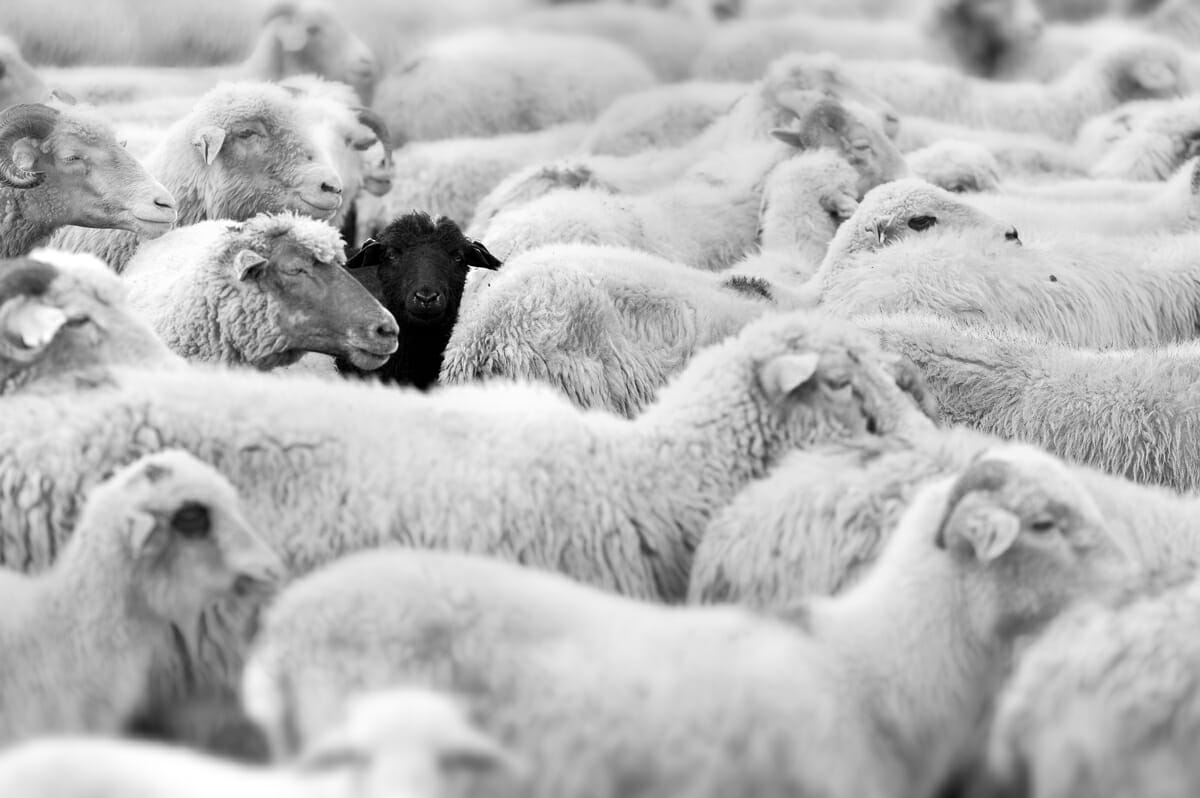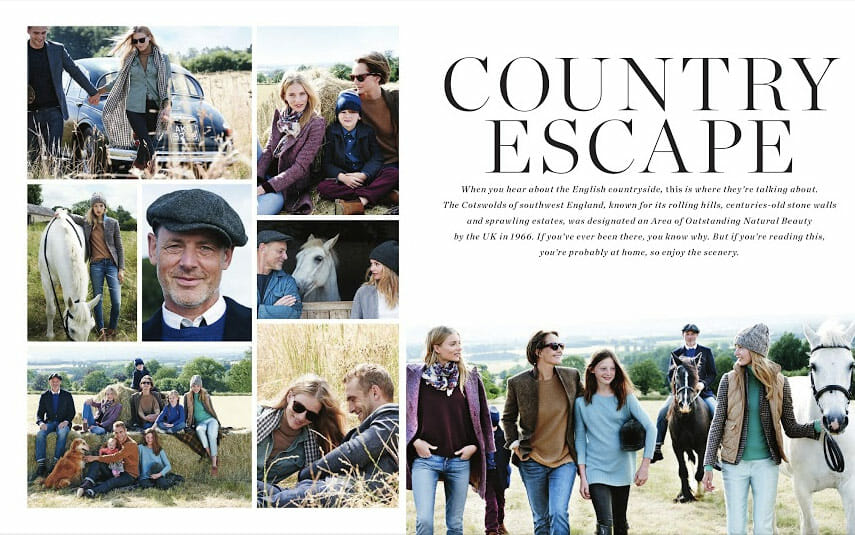Get your goat. High on the hog. We talk to an expert to learn the meaning behind agricultural idioms. Like, when did black sheep get such a bad rap?

To find out, we talked to Christine Ammer, author of “The American Heritage Dictionary of Idioms,” currently in its second edition. Ammer has been researching idioms for almost 50 years, constantly combing publications, television and films for phrases before diving into her research, seeking out the earliest known usage of sayings from “cudgel one’s brains” to “wrong end of the stick.”
She warned us that delving into the history of agrarian idioms was not for the faint of heart.
“Unfortunately,” says Ammer, “‘farm’ does often have a negative or diminutive context. It’s not always flattering to talk about farming.”
Below are just a few examples of popular agrarian idioms, explained by Ammer.
[mf_h5 align=”left” transform=”uppercase”]”Farm Out”[/mf_h5]
“That actually goes back to the mid-1600s. Originally, it meant to ‘let’ or ‘lease’ land, but today of course it means subcontracting work or the care of a dependent to another. And in baseball it means to assign a player to a lesser, or ‘farm’ league.”
[mf_h5 align=”left” transform=”uppercase”]”Buy the Farm”[/mf_h5]
“That dates from about the 1950s. Again, it’s kind of a bad thing to buy the farm because it means to die. To ‘buy the farm’ alludes to training flights of the air force that were crashing in the farmers’ fields. And when they did the farmers sued the government and the settlements were often enough to pay off the farmer’s mortgage. Since the pilot often died in such a crash he, in effect, bought the farm with his life. It may have originated in World War I, but I haven’t found any specific examples of that.”
[mf_h5 align=”left” transform=”uppercase”]”Not Worth a Hill of Beans”[/mf_h5]
“It means not to be worth anything. Because, actually, it’s funny, a bean was considered trivial or worthless even during the late 1800s. And a hill of beans alludes to a planting method whereby four or five beans are put in a little mound and they’re still worthless. They don’t often grow well that way. So ‘not worth a hill of beans’ refers to if you plant five beans, what are you going to get? Not a very big harvest.”
[mf_h5 align=”left” transform=”uppercase”]”Chickens Come Home to Roost”[/mf_h5]
“This means the consequences of doing wrong always catches up with the wrong-doer. And that idea has long been known, because chickens do come home to rest and sleep. That is ancient history, but the idea was used figuratively in 1809 when a poet, Robert Southey, wrote ‘Curses are like young chickens. They always come home to roost.’”
[mf_h5 align=”left” transform=”uppercase”]”Chicken Feed”[/mf_h5]
“A trifling amount of money. It alludes to the fact that chickens could be fed corn and wheat grains too small for other uses. That’s slang from the early 1800s.”
[mf_h5 align=”left” transform=”uppercase”]”Get Your Goat”[/mf_h5]
“This means to annoy or anger somebody by teasing them. The origin of this expression is actually disputed. But H.L. Mencken thought that it came from using a goat as a calming influence on a racehorse in his stall and removing it right before the race, making the horse so nervous it would lose. Now, there’s no firm impetus for this origin. The phrase dates back to about the 1900s, but no one has found a really interesting origin for it other than Mencken, so I’ll go with that.”
[mf_h5 align=”left” transform=”uppercase”]”Horns of a Dilemma”[/mf_h5]
“Meaning both alternatives are equally undesirable. So, ‘If I sell the house now, I have no where to live, but if I wait, I may not get a good price.’ That was first recorded in 1600 but the idea of being caught on one horn or the other of an animal was already expressed in Roman times. And I don’t even think it alludes to bullfighting. You never know quite exactly where things come from.”
[mf_h5 align=”left” transform=”uppercase”]”Black Sheep”[/mf_h5]
“The black sheep is the least reputable member of a family. I actually had an uncle many years ago who was considered the black sheep of the family, they thought he’d done some fraudulent stuff with the bank. In fact, I quote about him in the entry on black sheep in the book. Uncle Fritz was the black sheep of the family and we always thought he’d immigrated to Argentina to avoid jail. This is based on the idea that black sheep were less valuable than white ones because it was more difficult to dye their wool different colors. And in the 1500s the color black was considered the devil’s mark. But by the 1700s the term was widely used as it is today, for the odd person in the group.”
[mf_h5 align=”left” transform=”uppercase”]”Bring Home the Bacon”[/mf_h5]
“To earn a living and provide the necessities of life, the earliest citation of this phrase only dates to 1924 but the term is widely believed to come from the much older game of catching a greased pig, a popular competition at county fairs in which the winner was awarded the pig. I can’t imagine doing that, but who knows what went on at country fairs in the olden days.”
[mf_h5 align=”left” transform=”uppercase”]”Chew the Cud”[/mf_h5]
“To ruminate or to deliberate over something for more than four centuries is to think it over. Likening human chewing to cows and other ruminants, who bring up food in a cud that is chewed and swallowed again, goes all the way back to the Book of Josiah which was translated in 1382. Chewing the cud in the sense of deep thinking had made it’s way into a book of homilies by 1547. Now that’s ancient.”
[mf_h5 align=”left” transform=”uppercase”]”High on the Hog”[/mf_h5]
“To live high on the hog is to prosper luxuriously, and it alludes to the choicest cuts of meat which are found on the hog’s upper flanks. And that come from the late 1800s.”
This interview has been edited and condensed.
[mf_h5 align=”left” transform=”uppercase”]BONUS: Farm Pop Roundup[/mf_h5]
You cannot keep J. Crew off the farm. Whether it’s a “French Hen” sweater or a group of carefully rumpled, fresh-faced models cavorting amongst hay and horses in the November catalog, rest assured it will be relentlessly tasteful.
The latest threat to Austalia’s biosecurity? Katy Perry. When the country’s Department of Agriculture heard that the deluxe version of her most recent album “Prism” would be shipped with paper embedded with plantable seeds, the department jumped into action, requiring officials to confiscate them in case they spread pests. But there’s no hard feelings. Dr. Vanessa Findlay, Australia’s chief plant protection officer, told ABC News that “Most people are excited to think that there’s an attachment between biosecurity and someone as popular as Katy Perry.”
[mf_video type=”youtube” id=”CevxZvSJLk8″]
Dan Bejar, frontman of the Canadian indie-rock band Destroyer, rocks out with his chickens out in the video for “Bye Bye” from the album “Five Spanish Songs” out November 25. Parting shot? Bejar enjoys a piece of fried chicken. Bye bye.
[mf_video type=”youtube” id=”BIiQpcgPZRw”]
